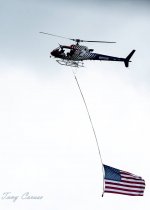Everyone has given good advise on the tow vehicles but what exactly which road do you take. I'm not a fan of Camping World but they put out a very good atlas that has highlighted truck roads. We always follow the truck routes in planning our trips because of making sure of bridge heights etc. Also this atlas has campgrounds marked.
We’ve crossed or been in the Rockies and western mountains numerous times with both BH and our SRW F350.
We’ll start from north to south...
In Montana
US 2
I 90
MT 1 from Anaconda to Phillipsburg
US 12 over Lolo pass to Idaho
US 93 from Idaho over the Bitterroots into MT
In Colorado
I 70 from Denver to Utah
US160 to Alamosa N to Salida E to Canon City
New Mexico
US 82 in the Lincoln NF (cloudcroft)
Washington
WA 410 near Mt Rainer
US 97 Wenatchee mtns
Arizona
I 17 from Flagstaff to Phoenix
And if you really want to experience elevation change the Rockies have nothing on the Appalachians. Traverse US 219 from I 64, Lewisburg WV, to Pennsylvania. May not be as high but very much steeper!!!!
And of course we were in the Canadian Rockies, other mountain ranges there and in Alaska.
To the OP, if your truck is sized correctly for your camper and follow the suggestions posted here, shouldn’t be a problem.
We can go a hellin’ uphill but I certainly take my time going down the other side!!!
Sent from my iPhone using Tapatalk

![IMG_0039[62].jpg IMG_0039[62].jpg](https://heartlandowners.org/data/attachments/42/42722-2434174424c512fe381203f8403e4370.jpg)
